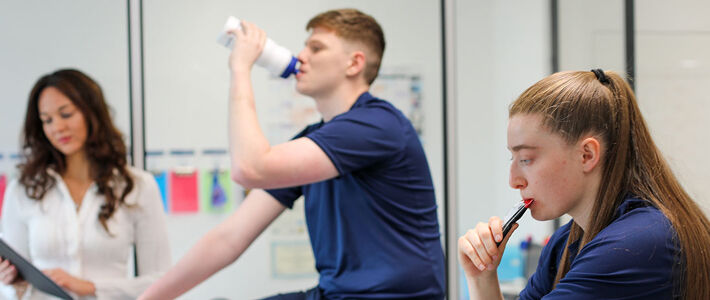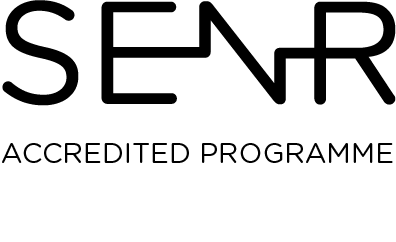
Sport and Exercise Nutrition - MSc
Currently viewing course to start in 2025/26 Entry.
Our MSc in Sport and Exercise Nutrition will allow you to gain the specialist skills and competencies needed to kick-start a successful career as a sport and exercise nutritionist or pursue further research in this subject area.
- Level Postgraduate Taught
- Study mode Full Time/Part Time
- Award MSc
- Start date September 2025
- Fees View course fees
- Subject
- Location City South / Alexander Stadium
This course is:
Open to International Students
Overview
Our MSc in Sport and Exercise Nutrition will allow you to gain the specialist skills and competencies needed to kick-start a successful career as a sport and exercise nutritionist or pursue further research in this subject area.
What's covered in this course?
The course is delivered through a series of taught and practice-based learning sessions delivered by our SENr-registered Sport and Exercise Nutrition academic staff. The practical sessions involve laboratory, field-based and nutrition kitchen-related work to develop the range of practical skills and competencies required of a sport and exercise nutritionist.
Taught sessions cover the key principles of sport and exercise nutrition, exercise metabolism and biochemistry, ensuring that you have a strong scientific knowledge underpinning your applied practice. Throughout the course, we will encourage you to critically evaluate the latest scientific research along with emerging themes in sport and exercise nutrition to develop an evidence-based approach to your work. Aligned to this, you will have the opportunity to engage in a Professional Practice placement which will allow you to apply your skills and knowledge with a range of external clients, including athletes from professional sport (for example football, cricket, rugby etc.), as well as the wider health and exercise community.
Accredited By
This course is accredited by:
Why Choose Us?
- Our year-long ‘Professional Practice’ module gives you the opportunity to develop essential practitioner skills and be well placed to secure a job upon graduation.
- This course has been accredited by the Sport and Exercise Nutrition Register (SENR), which means that those successfully graduating from these programmes will automatically be eligible to join the SENR Graduate Register.
- Learn from registered Sport and Exercise Nutritionists who bring a wealth of experience from applied and research settings to enrich your learning and provide you with key network/contacts in the industry.
- You will split your time between our campus in Edgbaston, Birmingham, and the world-class Alexander Stadium in Perry Barr, Birmingham, using industry-leading facilities for contemporary analysis methods (e.g. DEXA Scanner, Specialist Nutrition Kitchen), ensuring you are exposed to equipment you are likely to use in practice.
- Our brand new curriculum has been designed in collaboration with employers and is seeking professional body endorsement (SENr), ensuring the content you cover meets current sector demands.
- We've embedded additional qualifications as part of the course, such as ISAK Level 1; Food Safety & Hygiene Level 2; and UKAD Introduction to Clean Sport), meaning you could graduate with more than just a degree.
OPEN DAY
Join us for an Open Day where you'll be able to learn about this course in detail, chat to students, explore our campus and tour accommodation. Booking isn't open for this event yet, register your interest and we'll let you know as soon as booking goes live.
Next Event: 28 June 2025
Entry Requirements
Essential requirements
Applicants are normally expected to have a 2:2 honours degree, or equivalent, in a relevant discipline (Sport; Exercise; Health; Nutrition; Biochemistry; Dietetics).
The University operates a Recognition of Prior Learning (RPL) process that enables all applicants to gain recognition for previous studies and learning that relates to the course being applied for.
Applying with international qualifications
See below for further information on applying as an international student.
If you have a qualification that is not listed, please contact us.
Fees & How to Apply
UK students
Annual and modular tuition fees shown are applicable to the first year of study. The University reserves the right to increase fees for subsequent years of study in line with increases in inflation (capped at 5%) or to reflect changes in Government funding policies or changes agreed by Parliament. View fees for continuing students.
Award: MSc
Starting: Sep 2025
- Mode
- Duration
- Fees
- Full Time
- 1 Year
- £10,000 in 2025/26
- Part Time
- 2 Years
- Show fees
- £1112 per 20 credits
- Year 1 - 80 credits
- Year 2 - 100 credits
Fees for Part-time students
This course can be studied on a Part-time study basis. The cost per year of study is based on credit requirements for that year.
International students
Annual and modular tuition fees shown are applicable to the first year of study. The University reserves the right to increase fees for subsequent years of study in line with increases in inflation (capped at 5%) or to reflect changes in Government funding policies or changes agreed by Parliament. View fees for continuing students.
Award: MSc
Starting: Sep 2025
- Mode
- Duration
- Fees
- Full Time
- 1 Year
- £18,600 in 2025/26
Application deadlines
We advise you to apply early to allow sufficient time for you to prepare to start your studies in September. Please apply by Friday 18 July to allow time to arrange accommodation, student finance and visas where required.
Late applications will be accepted where places are still available, but please note that Welcome Week begins on Monday 15 September 2025, and teaching begins on Monday 22 September 2025. International students are invited to arrive from Monday 8 September 2025.
To find out more, see our application timeline.
Personal statement
You’ll need to submit a personal statement as part of your application for this course. This will need to highlight your passion for postgraduate study – and your chosen course – as well as your personal skills and experience, academic success, and any other factors that will support your application for further study.
If you are applying for a stand alone module, please include the title of the module you want to study in your Personal Statement.
Not sure what to include? We’re here to help – take a look at our top tips for writing personal statements and download our free postgraduate personal statement guide for further advice and examples from real students.
Course in Depth
Modules
To complete this course, you must successfully complete all the following CORE modules (totalling 180 credits):
This module aims to consider the underpinning nutrition theory and biochemistry of nutrition for health, exercise, and sports performance. It seeks to provide the essential scientific knowledge base of the body’s systems and fundamentals of human nutrition, to coincide with other modules where you will be required to consider the application of this knowledge within real-world sport and exercise nutrition settings.
This module will consider the link between nutrition and training & competition for sports performance. You will be able to empirically study the effect of nutritional strategies on sports performance across a range of performance types (e.g., strength, power, endurance). This module has a ‘practice-led, knowledge-applied approach’ and is therefore underpinned by the application of contemporary nutrition concepts and theory to an applied sports performance environment.
This module aims to provide you with the core practical competencies required in sport & exercise nutrition. You will consider a vast array of nutrition-related measurements including energy balance (intake and expenditure); anthropometrical assessments; body composition, methods of assessing dietary intake; and both physiological and biochemical markers of nutritional status.
This module will consider the role of both nutrition and physical activity in health and how these are integrated in the aetiology, management, and prevention of nutrition-related diseases. Moreover, you will also consider the effects of disease processes on both diet and nutrition, as well as exercise and sport performance.
The module will provide you with the skills required to work in a sport and exercise nutrition setting. You will undertake a year-long ‘case-study’ where you will provide nutrition support to an athlete, team, or health/exercise-based client. You will develop a critical understanding of the importance of evidence-based practice and contemporary nutritional topics throughout your professional practice. You will also develop essential communication skills, undertake reflection of your practice, and evaluate the role of sport and exercise nutritionists alongside other multi-disciplinary professionals.
This module specifically addresses the broader programme aims related to “practice-led, knowledge applied” through a flexible provision that encourages you to develop your research ideas, enabling you to satisfy your individual learning needs, whilst contributing to your area of study. It will contribute towards your personal and professional development fostering independent study.
This module provides you with the opportunity to complete a piece of work around a chosen topic, allowing you to demonstrate competence in the planning, execution, analysis and evaluation of a Research Project, a Systematic Review or Project Management.
Download course specification
Download nowThe course will utilise a variety of learning and teaching methods to encourage reflective and critical thinking skills, enabling you to become confident and autonomous learners. You will develop sound academic and practical competencies, so you are readily employable and well-equipped for lifelong learning.
The course will be delivered through a series of taught and practice-based learning sessions delivered by our SENr registered Sport and Exercise Nutrition academic staff. Practical sessions will involve laboratory, field-based and nutrition kitchen-related work to develop the range of practical skills and competencies required of a sport and exercise nutritionist. The theory sessions will cover the key principles of sport and exercise nutrition, exercise metabolism and biochemistry, ensuring that students have a strong scientific knowledge underpinning their applied practice.
You will be assessed using a range of methods including examinations, coursework assignments, presentations, case studies and practical assessments. There are formative assessment opportunities within all modules to help you prepare for summative assessments. Following completion of any summative assessment, you will receive written feedback on your performance, as well as guidance on how could improve for future assessments.

The Sport and Exercise Nutrition Register (SENR)
The Sport and Exercise Nutrition Register (SENR) is a voluntary register designed to accredit suitably qualified and experienced practitioners, who have the competency to work autonomously as a Sport and Exercise Nutritionist with performance oriented athletes, as well as those participating in physical activity, sport and exercise for health.
Those successfully graduating from these programmes will automatically be eligible to join the SENR Graduate Register.
Employability
You will learn a range of skills which will be key to enhancing your future employability.
Specifically, you will:
- Develop effective communication skills
- Learn to think critically and reflect on your own practice
- Apply your knowledge and skills within a professional setting, following a practice-led, knowledge-applied approach
- Learn to work independently and collaboratively.
- Become a self-motivated, organised, effective learner
- Develop interview and self-promotion skills
- Learn about business development.
Links to Industry
We have a wide array of links with partner organisations regionally, and nationally. These partnerships will provide work experience opportunities for you and contribute to your learning and teaching activities. We have links with numerous professional sports clubs (including football, rugby, cricket etc.) in addition to clients within the health sector.
Crucially, the opportunities for placement and links with external industry in this region are substantial, with the 2nd largest population in the UK on our doorstep. There are many professional sporting clubs, private organisations, recreational exercise groups and millions of people with whom our students can have a positive impact within their communities.
Placements
You will undertake a year-long Professional Practice placement module which will give you an invaluable opportunity to develop essential practitioner skills and experience. The placement aims to provide you with the skills required to work in a sport and exercise nutrition setting. The placement is designed to bring together all the skills, knowledge, and experiences that you will obtain throughout your degree course and attest to whether you are ready to become an applied sport and exercise nutrition practitioner. We have several placement opportunities available in both health- and sport-related settings.
Facilities & Staff
Teaching for our Sports courses is split between our campus in Edgbaston and the world-class Alexander Stadium in Perry Barr.
The Stadium was home to the Commonwealth Games in summer 2022, and the University has invested an additional £5m to develop space in the East and West Stands as a home for our students. We now have a range of bespoke learning spaces to offer you the very best experience on your course.
Our new home at Alexander Stadium
Biomechanics Lab
Our biomechanics laboratory features pressure plates in the floor and cameras mounted at the side. Sensors linked to a computer are used to record motion, evaluate people’s movements and analyse gait. Also in this space is an Isokinetic Dynamometer, which is used to assess limb strength.
Nutrition Kitchen
Our kitchen has several workstations to allow students to wash, prepare and cook food. This is where students analyse the effect of supplements or food groups on performance, and prepare recipes for athletes to support their training and fitness regime.
Performance Analysis Space
In our Performance Analysis Space, students are able to review data and video footage in order to develop strategy and provide advice to enhance athletes’ performance.
Physiology Lab
Our physiology lab contains an anti-gravity treadmill, environmental chamber and a range of equipment used for testing and analysis of athlete performance.
Sports Therapy Clinic
We have two Sports Therapy classrooms, as well as clinic spaces. The classrooms are set up with several therapy stations, each with a treatment couch. This is where we teach practical sessions, with students working together to build their skills. Our students also run a Sports Therapy Clinic for staff and students, where they are able to apply the skills they have learnt.
Strength & Conditioning Gym
This high-performance gym allows you to deliver hands on coaching and use state of the art equipment to measure performance and inform practice.
Our staff
Dr Neil Clarke
Associate Professor
Neil is the course leader for the MSc. Sport and Exercise Nutrition. Neil joined BCU as an Associate Professor in January 2024 after twelve years at the Coventry University and is also the joint cluster lead for Sport and Exercise Sciences research.
More about NeilJennie Carter
Senior Lecturer
Jennie is a Senior Lecturer on the MSc Sport and Exercise Nutrition Course at Birmingham City University. She is also the Professional Academic Lead for Sports Sciences.
More about JennieDr Charlie Roberts
Lecturer in Sport and Exercise Nutrition
Charlie leads modules related to nutrition and exercise on the MSc Sport and Exercise Nutrition and the BSc Sport and Exercise Science degrees. Charlie is research-active and has interest in areas such as supporting caregivers of young athletes in their ability to provide appropriate nutrition, eating disorders and disordered eating in athletes,...
More about Charlie

